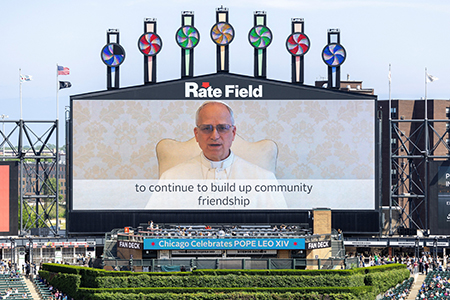Por Obispo Joseph R. Kopacz, D.D.
El Jubileo de la Esperanza ha definido los primeros 100 días del Papa León XIV y seguirá siendo el centro de atención en las primeras etapas de su papado hasta que se cierre la Puerta Santa en la Fiesta de la Epifanía en 2026. Eventualmente, el Santo Padre viajará a los confines de la Tierra, pero por ahora los peregrinos de todos los países donde la Iglesia Católica ha armado sus carpas están acudiendo en abundancia a Roma en la fe, la esperanza y el amor del Jubileo. A lo largo de los meses de mayo, junio y julio, el Papa León los abrazó con el amor de Dios. De una manera extraordinaria, el Año Jubilar ha sido testigo sin problemas de la transición del Francisco ignaciano al León agustino.
Recordemos que el Papa Francisco partió de este mundo el lunes de Pascua el día después del gran día de la esperanza, y su última aparición pública fue su bendición papal Urbi et Orbi el Domingo de Pascua. Desde su instalación un mes después como sucesor de Pedro, León XIV se ha envuelto en la bandera de la esperanza, rezando por la paz y la unidad en el mundo y en la Iglesia para crear una civilización del amor.

La predicación y la enseñanza del Santo Padre están dirigidas a los corazones y las mentes de todas las personas, pero especialmente a aquellos que han sido bautizados en el cuerpo de Cristo y están en el camino del discipulado. Sus palabras son tanto un mensaje de consuelo y aliento, como un llamado a la conversión y la misión.
Entre sus muchos discursos notables estuvo su mensaje a un estadio repleto en el lado sur de Chicago. En esta ocasión, el Papa León fue transmitido desde Roma a los fieles reunidos en White Sox Rate Field para la celebración de la Eucaristía, una Misa de Acción de Gracias en la Arquidiócesis de Chicago por el surgimiento de su hijo nativo como sucesor de Pedro. El cardenal Cupich imaginativamente llamó a su mensaje “el Sermón del monte”. La ocasión fue única, pero su mensaje fue universal.
Después de las palabras de saludo, el Santo Padre se alegró de celebrar la fiesta de la Santísima Trinidad, fuente de toda unidad, amor y paz. “Empiezo con eso porque la Trinidad es un modelo del amor de Dios por nosotros. Dios: Padre, Hijo y Espíritu. Tres personas en un solo Dios viven unidas en la profundidad del amor, en comunidad, compartiendo esa comunión con todos nosotros”.
Durante su discurso, el Santo Padre se dirigió directamente a los jóvenes reunidos en el estadio y a sus compañeros que participan en línea. Es un poderoso mensaje de esperanza, que señalo en gran parte: “Me gustaría enviar unas palabras de saludo en especial a todos los jóvenes, a los que estáis reunidos hoy, y a muchos de vosotros que quizás estáis viendo este saludo a través de medios tecnológicos, en Internet. A medida que crecen, pueden darse cuenta, especialmente después de haber vivido la época de la pandemia: tiempos de aislamiento, grandes dificultades, a veces incluso dificultades en sus familias o en nuestro mundo actual.
“A veces puede ser que el contexto de su vida no les haya dado la oportunidad de vivir la fe, de vivir como participantes en una comunidad de fe, y me gustaría aprovechar esta oportunidad para invitar a cada uno de ustedes a mirar dentro de sus propios corazones, a reconocer que Dios está presente de muchas maneras diferentes, Dios se acerca a ti, te llama, te invita a conocer a su Hijo Jesucristo, a través de las Escrituras, tal vez a través de un amigo o un pariente… un abuelo, que podría ser una persona de fe. descubrir lo importante que es para cada uno de nosotros prestar atención a la presencia de Dios en nuestro propio corazón, a ese anhelo de amor en nuestras vidas, para … buscar, una verdadera búsqueda, para encontrar las formas en que podamos hacer algo con nuestras propias vidas para servir a los demás”.
En su reflexión, el Papa León se dirigió a cada generación del Pueblo de Dios para que conozcan su dignidad como hijos de Dios, conozcan personalmente al Señor Jesús como amigo y abracen el llamado a ser embajadores de la esperanza en este mundo. “Por lo tanto, me gustaría invitarlos a todos a tomarse un momento, a abrir sus propios corazones a Dios, al amor de Dios, a esa paz que solo el Señor puede darnos. Sentir lo profundo hermoso, fuerte, y significativo que es el amor de Dios en nuestras vidas. Y reconocer que mientras no hacemos nada para ganarnos el amor de Dios, Dios en su propia generosidad continúa derramando su amor sobre nosotros. Y mientras nos da su amor, solo nos pide que seamos generosos y que compartamos lo que nos ha dado con los demás”.
En otras palabras, jueguen pelota en el estadio del reino de Dios.



